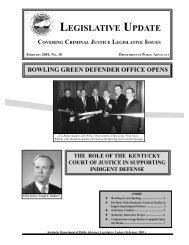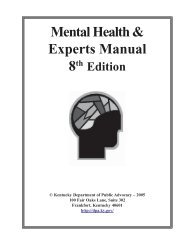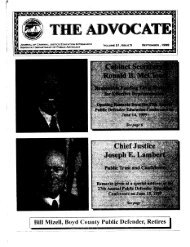May 2002 - Department of Public Advocacy
May 2002 - Department of Public Advocacy
May 2002 - Department of Public Advocacy
You also want an ePaper? Increase the reach of your titles
YUMPU automatically turns print PDFs into web optimized ePapers that Google loves.
Continued from page 33<br />
necessary for appellate counsel to raise every nonfrivolous<br />
claim on direct appeal.” Jones v. Barnes, 463 U.S. 745 (1983).<br />
“The process <strong>of</strong> ‘winnowing out weaker arguments on appeal’<br />
is ‘the hallmark <strong>of</strong> effective appellate advocacy.’” Id. at<br />
751-752. “Generally, only when ignored issues are clearly<br />
stronger than those presented, will the presumption <strong>of</strong> effective<br />
assistance <strong>of</strong> counsel be overcome.” Gray v. Greer, 800<br />
F.2d 644, 646 (7 th Cir. 1986).<br />
Monzo specifically claims that appellate counsel was ineffective<br />
when it failed to argue that trial counsel was ineffective<br />
by failing to (1) move for suppression <strong>of</strong> evidence or<br />
dismissal <strong>of</strong> charges because <strong>of</strong> destruction <strong>of</strong> the victim’s<br />
rape kit and (2) move for dismissal <strong>of</strong> the charges as a violation<br />
<strong>of</strong> the statute <strong>of</strong> limitations for rape indictments or unjustified<br />
pre-trial delay. As to the destruction <strong>of</strong> the rape kit<br />
(this occurred in 1990), this evidence was only “potentially<br />
useful” and the government was merely negligent in destroying<br />
the evidence. Arizona v. Youngblood, 488 U.S. 51 (1988)<br />
was not violated by destruction <strong>of</strong> the rape kit. As to the<br />
argument that the statute <strong>of</strong> limitations was violated, a criminal<br />
complaint and an arrest warrant were filed four months<br />
before the statute <strong>of</strong> limitations would have run, and under<br />
Ohio law, this marked the commencement <strong>of</strong> the criminal prosecution.<br />
It does not matter that the indictment was not returned<br />
until the statute <strong>of</strong> limitations had run. As to preindictment<br />
delay, Monzo has failed to <strong>of</strong>fer pro<strong>of</strong> that the<br />
prosecution delayed indictment in order to gain tactical advantage<br />
over him, U.S. v. Brown, 959 F.2d 63, 66 (6 th Cir. 1992).<br />
In fact, there was no evidence that Monzo had ever been<br />
identified as a suspect prior to the AFIS identification.<br />
Trial Counsel IAC Claims-<br />
No “Unreasonable Application” <strong>of</strong><br />
Strickland by State Courts<br />
Finally, the 6 th Circuit reviews the remaining 3 ineffective assistance<br />
<strong>of</strong> trial counsel claims that were not procedurally<br />
defaulted. Monzo’s claim is that the state court’s decision on<br />
these claims involved an unreasonable application <strong>of</strong><br />
Strickland.<br />
THE ADVOCATE Volume 24, No. 3 <strong>May</strong> <strong>2002</strong><br />
34<br />
The 6 th Circuit summarily rejects these claims. First, as to<br />
Monzo’s argument that trial counsel erred in not calling more<br />
alibi witnesses, the Court notes that several alibi witnesses<br />
were called at trial and the jury chose not to believe them<br />
because <strong>of</strong> the very persuasive fingerprint evidence. “It is<br />
unlikely that the presentation <strong>of</strong> further alibi evidence would<br />
have impacted the jury’s decision.” As to Monzo’s claim that<br />
trial counsel erred when it failed to seek some discovery from<br />
the prosecution, the Court accepts trial counsel’s testimony<br />
that if he would have sought this discovery, he would have<br />
had to turned over some <strong>of</strong> the defense investigation under<br />
the Ohio reciprocal discovery rule. Monzo also argues that<br />
counsel was ineffective for failing to obtain credit card receipts<br />
showing he was out <strong>of</strong> state at the time <strong>of</strong> the rape and<br />
W-2 forms proving he had worked extensively on the remodeling<br />
<strong>of</strong> the victim’s house. Absent Monzo’s procurement <strong>of</strong><br />
these records at this point to prove their necessity, it cannot<br />
be said that these records were exculpatory. Counsel was<br />
also not ineffective in providing Mr. Monzo’s employment<br />
records to the prosecution pre-indictment. These records<br />
led to the prosecution’s calling <strong>of</strong> a witness at trial that seriously<br />
damaged the defense’s case. The Court notes that,<br />
while in hindsight this may not have been the wisest move<br />
by trial counsel, at that point counsel was relying on Monzo’s<br />
claims <strong>of</strong> innocence and was doing everything possible to<br />
avoid an indictment. Similarly, counsel was not ineffective<br />
for stopping Monzo from writing a letter to the judge explaining<br />
his presence at the victim’s house which was used at trial<br />
to impeach him. Monzo himself chose to write that letter.<br />
Coleman v. DeWitt<br />
<strong>2002</strong> WL 377008 (6 th Cir. 3/12/02)<br />
In <strong>May</strong>, 1997, Coleman entered a plea <strong>of</strong> nolo contendre to<br />
involuntary manslaughter and felonious assault. He had<br />
kicked Olivia Williams in the stomach while battering her. As<br />
a result, Ms. Williams suffered a miscarriage. Coleman argues<br />
that the involuntary manslaughter conviction violates<br />
his 14 th amendment due process rights under Roe v. Wade,<br />
410 U.S. 113 (1973), and its progeny because the Ohio manslaughter<br />
statute did not require pro<strong>of</strong> <strong>of</strong> the miscarried fetus’<br />
viability for conviction. He further argues that his 9 year<br />
sentence for involuntary manslaughter is cruel and unusual<br />
punishment. The 6 th Circuit rejects his arguments and affirms<br />
the denial <strong>of</strong> a writ <strong>of</strong> habeas corpus.<br />
Statute Making Termination <strong>of</strong> Another’s Pregnancy a<br />
Crime is Constitutional Despite no Requirement <strong>of</strong> Pro<strong>of</strong><br />
<strong>of</strong> Viability <strong>of</strong> Terminated Fetus<br />
The Ohio involuntary manslaughter statute reads as follows:<br />
“No person shall cause the death <strong>of</strong> another or the unlawful<br />
termination <strong>of</strong> another’s pregnancy as a proximate result <strong>of</strong><br />
the <strong>of</strong>fender’s committing or attempting to commit a misdemeanor<br />
<strong>of</strong> any degree.” Coleman argues that because the<br />
involuntary manslaughter statute does not require the state<br />
to prove viability <strong>of</strong> the terminated fetus, the statute is beyond<br />
the state’s prescriptive power under Roe and is therefore<br />
unconstitutional. The Court first notes that “the ‘essential<br />
holding <strong>of</strong> Roe’ is a ‘recognition <strong>of</strong> the right <strong>of</strong> the woman<br />
to choose to have an abortion before viability and to obtain it<br />
without undue influence from the state.” quoting Planned<br />
Parenthood <strong>of</strong> Southeastern Pennsylvania v. Casey, 505 U.S.<br />
833, 846 (1992). The Court was not holding, as Coleman<br />
argues, that state has no interest in protecting the life <strong>of</strong> the<br />
unborn; “quite to the contrary, the Court in Roe recognized<br />
that the state had important interests in protecting fetal life.”<br />
While a woman’s substantive due process right to decide the<br />
outcome <strong>of</strong> her pregnancy is compelling, and thus triggers<br />
strict scrutiny <strong>of</strong> any statute limiting the interest, “Ohio’s<br />
interest in the protection <strong>of</strong> fetal like need not be compelling,<br />
however, to justify the application <strong>of</strong> the Ohio involuntary








